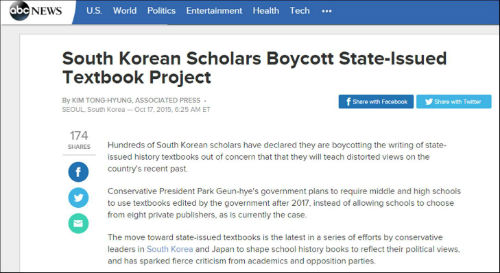“한국 최대 역사학계 단체, 왜곡 시각 우려해 집필 거부 선언”
미국 <뉴욕타임스>에 이어 <AP통신>도 한국의 역사 교과서 국정화 논란을 타전했다.
17일(현지시간) <AP통신>은 「한국 학자들, 국정 교과서 추진안 거부」라는 제목의 기사를 통해 역사학자들의 ‘집필 거부’ 선언을 상세히 전했다. <ABC뉴스>는 <AP통신>의 이같은 기사를 받아 보도했다. (☞ 해당 보도 원문 보러가기)
기사는 “수백 명의 한국 학자들이 국정 역사교과서가 한국 근대사에 대한 왜곡된 시각을 가르치게 될 것을 염려하며 그 집필을 거부한다고 선언했다”고 전했다.
이어 “한국의 국정교과서 추진 움직임은 역사교과서에 자신들의 정치적 시각을 반영시키고자 한국과 일본의 보수주의자들이 벌여온 일련의 시도 중 가장 최근의 것으로 학계와 야당으로부터 맹렬한 비난을 불러일으켰다”고 보도했다.

<AP통신>은 이와 함께 한국 역사학계의 최대 단체인 한국역사연구회의 집필 거부 소식도 타전했다.
또한 박근혜 대통령에 대해 “1960년대와 70년대 한국을 통치했으며 성공적인 경제 전략가로서의 치적조차 시민 억압의 잔혹한 행적 탓으로 그 빛을 잃은 살해당한 군사독재자 박정희의 딸”이라고 설명했다.
<AP통신>은 이어 “학생들의 시위가 점점 확산되는 가운데 계엄령을 선언하고 유신헌법을 통과시켜 사실상 종신 대통령이 된 지 2년 후인 1974년 국정 역사교과서를 도입한 사람은 바로 박근혜의 아버지”라며 “2000년대 초가 되어서야 한국은 역사교과서 출판을 자유화하기 시작했고 2011년 이후 모든 역사교과서들은 민간 출판사들에 의해 집필됐다”고 지적하기도 했다.
| 다음은 ‘뉴스프로’의 <ABC뉴스>가 보도한 <AP통신> 기사 번역 전문. South Korean Scholars Boycott State-Issued Textbook Project BY KIM TONG-HYUNG, ASSOCIATED PRESS Hundreds of South Korean scholars have declared they are boycotting the writing of state-issued history textbooks out of concern that that they will teach distorted views on the country’s recent history. President Park Geun-hye’s government plans to require middle and high schools to use textbooks edited by the government after 2017, instead of allowing schools to choose from eight private publishers, as is currently the case. South Korea’s move toward state-issued textbooks is the latest in a series of efforts by conservative leaders in Seoul and Tokyo to shape school history books to reflect their political views, and has sparked fierce criticism from academics and opposition parties. Professors from more than 20 South Korean universities said they would not contribute to the textbooks because they believe the government is moving to soften descriptions of South Korea’s brutal dictatorships that preceded a bloody transition toward democracy in the 1980s. The Korean History Research Association, the country’s largest group of historians with nearly 800 members, has declared it won’t participate in the writing process. Kang Sun-a, a spokeswoman of the opposition New Politics Alliance for Democracy, said that the directive to revert to state-issued history textbooks has “instantly taken the country back to the Cold War period.” In announcing the controversial plans on Monday, Education Minister Hwang Woo-yea argued that the current history textbooks are too left-leaning and encourage views sympathetic to North Korea and urged for the need of school books that were “objective” and “balanced.” The plan was to recruit professional historians to help write the new textbooks. Before leaving for her current trip to the United States, Park defended the move toward state-issued textbooks by saying history classes must inspire “pride” in students for being South Korean citizens. Park is the daughter of slain military dictator Park Chung-hee, who ruled South Korea in the 1960s and 70s, and whose legacy as a successful economic strategist is marred by brutal records of civilian oppression. Lee Shincheol, a historian at Seoul’s Sungkyunkwan University and a contributing author of one of the current textbooks, said that the government’s criticism makes little sense because private publishers had been required to follow editorial guidelines set by the Education Ministry and have their content reviewed by a state-run history institution. For the government to insist on full control over textbooks would eliminate academic freedom and result in politicized historical narratives. “Even Korea’s feudal monarchs had granted autonomy to royal chroniclers, but Park’s concept of history is more outdated than that of old kings,” Lee said. The government of Japanese Prime Minister Shinzo Abe also in recent years has been criticized for trying to influence textbooks for political purposes. Japan’s Education Ministry last year introduced a textbook screening policy that required private publishers reflect the government’s official position on contentious issues in modern history to “balance out” references to Japan’s wartime aggression. Lee argued that the step taken by Park’s government might be even more regressive, pointing out that Japan hasn’t been using state-issued textbooks since the end of World War II. It was Park’s father who introduced state-issued history textbooks in 1974, two years after he declared martial law amid widening student protests and rammed through a new constitution that effectively made him president for life. It was not until the early 2000s when South Korea began liberalizing the production of history textbooks, and since 2011, all history books used in middle and high schools have been written by private publishers. Park’s decision to revert to the old textbook system seems to be an effort to rally her conservative supporters in a country deeply split along ideological and generational lines, according to an official at Moon’s party, who didn’t want to be named, citing office rules. South Korea holds its next parliamentary elections in April next year. |


